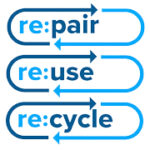 Timothy Burroughs, the Executive Director of StopWaste, introduced the public agency to Environmental Concerns Speaker Series attendees on November 14th, 2022. He discussed the Organics Reduction and Recycling Ordinance (SB 1383) that went into effect earlier that same year. StopWaste is a government agency that works for Alameda County and is involved in a Joint Powers Authority which is an entity that works across 17 local governments. Specifically, it is governed by the Alameda County Waste Management Authority, the Alameda County Source Reduction and Recycling Board and the Energy Council. It helps businesses, residents, and schools dispose of trash, recycle responsibly, and use water, energy and other resources efficiently.
Timothy Burroughs, the Executive Director of StopWaste, introduced the public agency to Environmental Concerns Speaker Series attendees on November 14th, 2022. He discussed the Organics Reduction and Recycling Ordinance (SB 1383) that went into effect earlier that same year. StopWaste is a government agency that works for Alameda County and is involved in a Joint Powers Authority which is an entity that works across 17 local governments. Specifically, it is governed by the Alameda County Waste Management Authority, the Alameda County Source Reduction and Recycling Board and the Energy Council. It helps businesses, residents, and schools dispose of trash, recycle responsibly, and use water, energy and other resources efficiently.
Their funding comes in part from landfill tonnage–based fees and grant awards. StopWaste’s goal is to utilize materials and energy in ways that are good for the health of communities, local economies and the planet. Burroughs said that they accomplish this by promoting gardening, electrification and other ways to be environmentally efficient. The services that StopWaste provides are grant funding, technical assistance, community engagement and education, network building, public outreach campaigns, energy incentive programs, ordinance enforcements and market development.
StopWaste works on many issues relating to environmental concerns. They support California Senate Bill 1383 which is a policy that is designed to reduce methane emissions by diverting organic materials away from landfills and into compost. Burroughs explained that when compost goes into landfills, it decomposes and releases methane. Methane is a greenhouse gas and is extremely toxic to the environment. He said StopWaste plans to offer compliance and monitoring assistance for cities, free resources and training for businesses, guidance for food serving businesses to minimize food waste and to help maintain the enforcement of this new law.
StopWaste also hosts campaigns to prevent food waste at home, schools and work. They continue to reduce food waste to also help food recovery organizations and connect groups through the Alameda County Food Recovery Network. Burroughs said they continue to support innovation, build infrastructure, provide technical assistance, and do outreach to food service operators to support reusable foodware and plastic waste prevention. StopWaste also provides compost hubs and gardening assistance by increasing access to compost for residents and businesses. In addition, they provide sustainable gardening resources and partner with water agencies.
They are very involved with helping schools educate youth about the 4Rs–refuse, reduce, reuse and recycle. Burroughs said that StopWaste shows students how the trash systems work and assists school districts with SB 1383 compliance. Burroughs recommends the RE:Source Tool which is a guide for reuse, repair, recycling and safe disposal across Alameda County. It also includes detailed information for every city and has safe disposal options for household hazardous waste. Stopwaste also offers energy efficiency and electrification incentive programs for single family and multifamily households.
At the end of Burroughs’s presentation about StopWaste, he took some time to answer questions from the meeting’s attendees. When asked about how to teach people about where to put waste, he answered with how the government is working to have consistency in the bin colors and how the State is now providing more instructions about what is recyclable. Another attendee asked if the Plastic Task Force in Berkeley was helpful, and Burroughs responded by describing how impressive and efficient they are. One attendee was concerned with the use of plastic and wanted there to be more legislation. Burroughs said that we ultimately need to work with plastic producers to limit plastic production. He also brought up California Senate Bill 54 which is a producer responsibility law that reduces the amount of plastic that is produced, and requires plastic to be recyclable.
When asked about how StopWaste talks about the recycling industry, Burroughs said their goal is to prevent waste from happening in the first place and create a circular economy–where we can take products and continue to reuse them. Another attendee asked if StopWaste collects large trash like a grill or a bed. Burroughs said they do not directly collect trash, but rather they continue to educate the community about how to deal with big waste. To close out the meeting, Burroughs urged attendees to check out StopWaste’s services and to participate in a circular economy that is ultimately more efficient and environmentally better than not being aware of waste.
–Victoria Burgess
All League News

